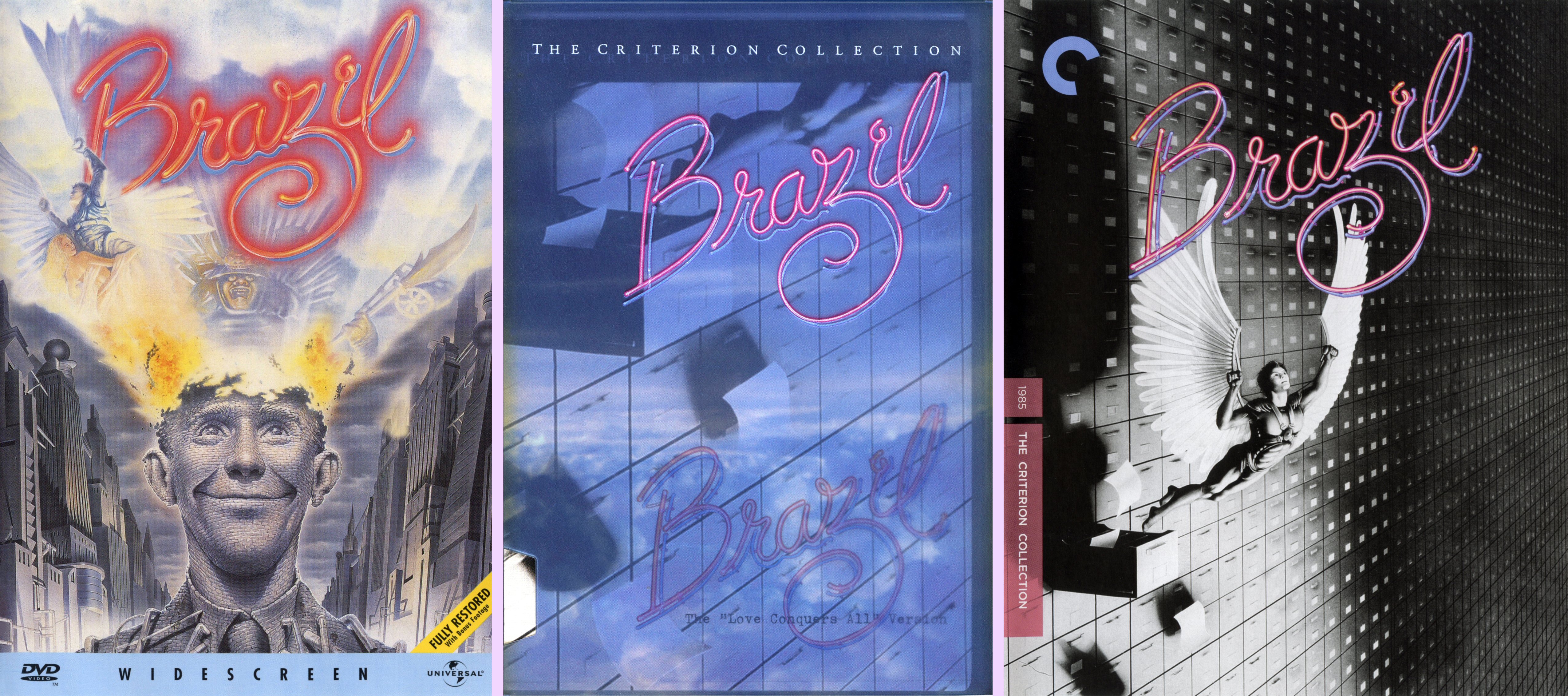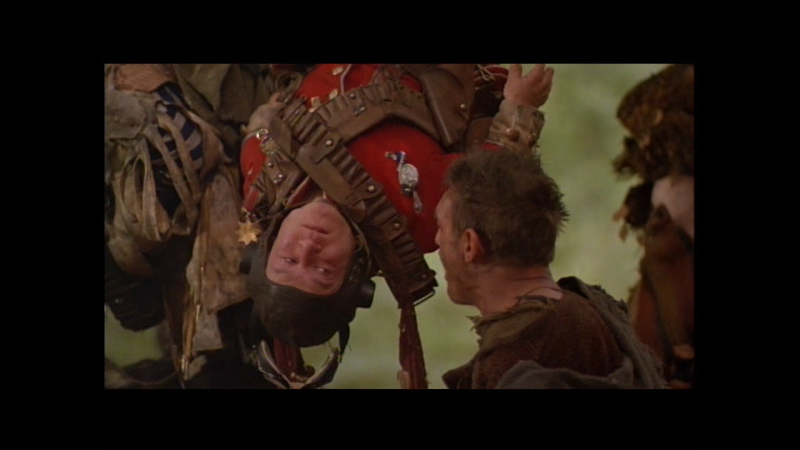Unlike their previous films, The Meaning Of Life is a sketch film. Admittedly, their other features are essentially a series of sketches strung together along a fairly thin plot, and this one does have a running theme that unifies these skits more than your average episode of Flying Circus, but there's still less of a through-line here. This quality is something the troupe themselves frequently point to for its lesser critical and box office reception. But I daresay it's some of their strongest and most consistent sketch work in their catalog. Sure, some moments still lay flat; but there's a stronger hit to miss ratio here than in any other sketch show I could name. And as Run, Ronnie, Run taught us: sometimes sketch comedy is better left as sketch comedy.
The Crimson Permanent Assurance (Gilliam's aforementioned short) encapsulates everything that's right and wrong with Gilliam's filmography. It's clever and looks beautiful. And it goes on for way too long. The novelty of its premise is over in like 90 seconds, but it's committed to following through on an entire beginning, middle and end of the story of its nameless characters who you never come to care about. It was nominated for a BAFTA, though (yes, the short on its own), so he's clearly doing a lot right. The production values are impressive - it's no surprise Gilliam made Brazil after this. But two big battle scenes is one too many; the joke's already been told. Although ending it with a silly Eric Idle song is a cheerful way to tie it into the rest of the feature.
It doesn't help that the concept of a scene is repeatedly "can you believe we're going this far for one tiny joke?" There's the waiter who we follow all the way from his restaurant to his family cottage (the deleted scenes show there was an even longer version!), the "Every Sperm Is Sacred" song, which is brilliant for one verse, but after that is just committed to blowing out the spectacle with bigger and bigger crowds or the surreal but meaningless "where did that little fish go" sequence. That's a problem with joke songs in general, which tend to tell the joke in the first verse but are committed to two more verses and three more choruses before they can move on. And there are a lot of songs in here - you could honestly classify this as a musical. But the gags and the performances that work are real "Greatest Hits" material, and the way it follows humanity from life to death (and beyond) and throughout the ages does make it feel its imparting something of substance, even if it's probably not really.
Universal first released Monty Python's The Meaning Of Life on DVD through Image Entertainment back in 1997. It was widescreen but non-anamorphic and completely barebones. They didn't dip into the good stuff until 2003, when we got the "Two-Disc Special Edition" which was now anamorphically enhanced and packed with extras, both excellent and ridiculous. There were a couple basic reissues after that, like a Universal 100th Anniversary edition, which was basically just the first disc from the 2003 set, and a 3-disc "Iconic Comedy" set that packaged it with American Pie and The Big Lebowski. And if you think that's cheesy, there was a 2-disc set in the UK that paired it with the Alicia Silverstone comedy Scorched.
 |
| Have you ever wondered what quality content lay within one of these? |
 |
| 1) 2003 DVD; 2) 2014 BD; 3) 2022 BD; 4) 2022 UHD. |
The 2003 DVD gives us a 5.1 remix, plus a French mono dub, with optional English, French and Spanish subtitles. The blu-ray is more or less the same, except it bumps the 5.1 to DTS-HD (yes, the French track is lossy). The UHD replaces the 5.1 with a new DTS:X mix (plus a million foreign dub and sub options I'm not going to bother listing out). You know what would've been nice? The original stereo mix, which was on the original 1997 DVD. But these remixes don't sound like they're going too crazy.
The extras, starting with the 2003 set (Image's DVD didn't even have the trailer; and worst of all, it came in a snapper case) can be cleanly divided into two categories: Quality and Novelty. Fortunately, there's plenty of the former. Gilliam and Jones provided an audio commentary, recorded separately but edited together into one reasonably interesting track. That's a real value adding special feature you'd follow under Quality. Then there's another track called "the soundtrack for the lonely," where Michael Palin laughs at the jokes and makes mild small talk comments to make ostensibly make you feel like you're watching the movie with someone. That's a silly gimmick that's amusing to read on the back cover, but nothing you'd want to sit and listen all the way through for two hours, ergo Novelty.
One thing the special edition DVD has that none of the later, HD discs offer, was the option to watch an extended cut with three deleted sequences reinstated into the film. They all include the sequences in their deleted scenes, but only the DVD has option to watch it as a longer cut. I'd say the theatrical cut is the superior film, and I suspect Sony and the Pythons agree, which is why it was subsequently dropped. But it's a shame, too, because in the deleted scenes, they have forced audio commentary. So if you want to watch the Martin Luther sequence, for example, and actually hear what the characters are saying, you can only do it on the DVD. Still, the deleted scenes are a great Quality addition on all the releases.
Other quality stuff includes a roughly 50-minute retrospective featurette, the trailers (be sure to watch the one where the Pythons attempt to sell us the film via telepathy) and some alternate versions of the songs from the films, sung by Idle and Jones. There's also a nice little featurette on the dance numbers with Jones, the choreographer and one of the original dancers. Then there's a bunch of novelty nonsense, where the Pythons improve thoughts of fish over footage of a fish tank or a fake restoration featurette where they try to clean the film with soap, and several more, short fake featurettes. They're all mildly amusing, but require more patience than they're really worth. That fish tank thing lasts almost twenty minutes - has anyone ever actually watched it all the way to the end?
Anyway, apart from removing the extended cut option, the extras remain the same on all the later editions, up to and including the UHD. But the HD options do add the reunion, which is fun. It's an hour-long, directionless chat with the Pythons in meeting up in a hotel room (and Idle calling in remotely via webcam). They start out just repeating all the Meaning Of Life anecdotes from the other extras, but soon spiral off into a dozen random tangents, about how modern comedy is too PC to their sincere beliefs on life after death. Fans will enjoy it, but it's nothing amazing; and it doesn't help that I feel like I've watched the Pythons do at least two dozen of these reunion chat panels since the 90s. The UHD set also comes in a stylish slipcover.
There had been rumors that all of the Python rumors were getting 4k restorations, but somehow we ended up with just this one. Well, this turned out quite well (though the original stereo mix and the deleted scenes sans commentary would've turned this positive review into a proper rave), so I'm glad. If you're still deciding whether to double-dip your BD, I'd say definitely go for it. For Python fans, I feel The Meaning Of Life is really underrated. And for Gilliam fans, it's a treat to see him break out as a singular filmmaker.
























































